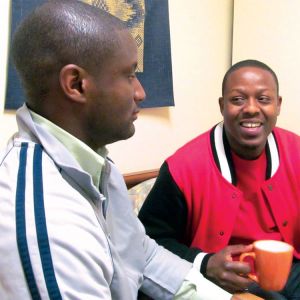“These are kids that are very much at risk of falling through the cracks. They have been in care most of their lives in many cases and when they reach 16 years of age, they’re expected to go out and live independently in the world. And we think that is an unrealistic expectation and that these kids need support to transition into adulthood,” said Michael Fullan, executive director of Catholic Charities.
Catholic Charities has been running the Youth in Transition program to help these young people find their way. The pilot project, which is in its fourth year, is run out of Toronto’s Covenant House, a shelter for homeless youth in downtown Toronto, with participation from other Catholic Charities agencies. The program provides youth aged 16 to 24 with up to 20 to 24 hours of one-on-one attention a week to teach them the skills they need and connect them with the appropriate community resources.
“We were aware that there were a number of kids falling through the cracks. We hear that from different service providers and our agencies,” Fullan said.
“If we weren’t working with these kids, I don’t think it’s an exaggeration to say you would see many of them getting involved with the criminal justice system. You have high levels of unemployment, great risk of drug and alcohol, substance abuse kinds of issues, higher teen pregnancy. This is a safeguard to help ensure a more positive future.”
The program has two full-time staff.
“These kids often have difficulty navigating the community that we might take for granted. Going to the doctor, getting a good doctor, going to the bank. They’re frustrated, so they tend to avoid those situations. They don’t feel confident,” said Fullan. “This worker would work with them, attend these sessions with them… assist them.”
The Catholic Children’s Aid Society of Toronto, Rosalie Hall for young single mothers, Catholic Crosscultural Services, Catholic Family Services and Sancta Maria House are among the agencies that refer youth to the program. Forty to 45 youth are enrolled in the initiative. Since the program began, more than 130 youth have been through the program. Thirty-five per cent of these youth were age 16 to 18 while 51 per cent were aged 19 to 21.
Catholic Charities signed up to fund the project for five years, and Fullan hopes it will continue beyond that. In the first three years, a longitudinal study was conducted through Ryerson University to measure participants’ problems, needs and successes in accessing and using resources. The Ontario Institute for Studies in Education at the University of Toronto has taken over the last two years of the study.
With good social research, said Fullan, he can show that youth are able to stabilize their lives, be employed, stay out of jail and befriend the right people. So far, results of the study are positive.
“It’s a preventative program in an era where we’re not putting a lot of attention into prevention… We’re reacting to situations and not getting to the core of the issues,” said Fullan, who concedes the program is expensive. “I think we’ll see that it is a good strategic investment for the future of this province and for this group of kids.”
Programs like Youth in Transition existed back in the 1970s and ’80s, but government funding disappeared during a downturn in the economy.
“We can’t measure preventative, so we tend to cut it,” he said. “You invest in these young people now and pick them up here, they’re going to be less of a burden on the system five, 10 years down the road because they’re going to be capable, contributing adults.”


